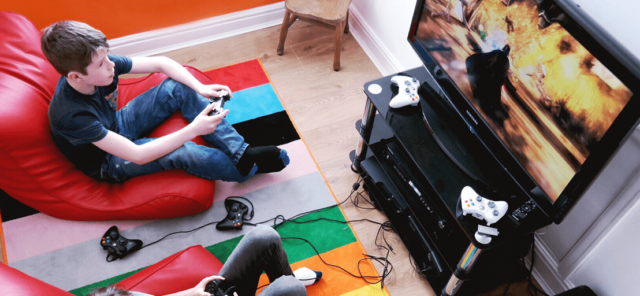What is the impact of video games like Friday Night Funkin’ on ADHD?
Ask an Expert
What is the impact of video games like Friday Night Funkin' on ADHD?
Clinical Expert: Stephanie Ruggiero, PsyD
en Español
Question
What impact do video games such as Friday Night Funkin’ have on preteens/teens with ADHD and executive functions?
Answer
Many kids with ADHD are very drawn to video games. They are visually appealing and fast-paced, with instant rewards and consequences. That’s very stimulating for any kid, but maybe more so for someone with ADHD who has difficulty attending to things that aren’t very exciting.
While I’m not very familiar with Friday Night Funkin’, it seems like it’s a repetitive game that tests players’ reflexes and sense of rhythm and gives instantaneous feedback. You can see how a kid with ADHD might find that game particularly engrossing.
Video games aren’t necessarily a bad thing for kids with ADHD. In fact, in 2020 the FDA approved a digital game aimed at improving attention function in children with ADHD. Other games may even help to foster executive functioning skills like getting organized, solving problems flexibly, or controlling impulses. For example, with Minecraft you’re planning and strategizing a lot and that could potentially give kids extra practice with some of those skills.
With any new game I recommend playing or watching a little with your child to see what the game involves. Are there any executive function skills required? Is it too mature or too challenging, which can lead to frustration?
Even if the game seems good, setting limits for how much access your child has is important because it helps make sure they’re getting enough opportunities to do the other things they should be doing, like socializing with friends and family, completing homework, or just playing outside. These other activities are essential and give children and adolescents opportunities to develop important skills.
Finally, because it can be hard for kids with ADHD to transition away from video games, it’s a good idea to set expectations in advance. Using a visual timer is really helpful. Your child might also appreciate warnings for when there’s 10 or 5 minutes left of game time. Then if they don’t stop when the timer goes off, there can be a rule that they’ve lost a portion of their playing time the next day. Sharing these clear rules ahead of time lets everyone know what to expect, which helps to avoid conflict. Engaging your child in the discussion ahead of time and providing them with choices (do you want a reminder at 5 minutes, 10 minutes or both?) may also help. In addition to clear boundaries and follow through, your child may also benefit from a mini reward or incentive like a few extra minutes of game time on the weekends if they abstain from arguing about gaming during the week.
This article was last reviewed or updated on August 7, 2024.
Topics

Stephanie Ruggiero, PsyD
Stephanie Ruggiero, PsyD
Stephanie G. Ruggiero, PsyD, is the assistant director of the ADHD Summer Program and a psychologist in the ADHD and … Read Bio
Was this article helpful?
Related Reading
-
 Do Video Games Cause ADHD?
Why kids with attention problems are so focused—even fixated—on the screen
Do Video Games Cause ADHD?
Why kids with attention problems are so focused—even fixated—on the screen
-
 Healthy Limits on Video Games
How to prevent (or overcome) problems with gaming
Healthy Limits on Video Games
How to prevent (or overcome) problems with gaming
-
 Hyperfocus: The Flip Side of ADHD?
Why it's more appropriate to think of ADHD as dysregulation, not deficit, of attention
Hyperfocus: The Flip Side of ADHD?
Why it's more appropriate to think of ADHD as dysregulation, not deficit, of attention
-
 Complete Guide to ADHD
Children with attention-deficit hyperactivity disorder (ADHD) find it unusually difficult to concentrate on tasks, to pay attention, to sit still, and to control impulsive behavior.…
Complete Guide to ADHD
Children with attention-deficit hyperactivity disorder (ADHD) find it unusually difficult to concentrate on tasks, to pay attention, to sit still, and to control impulsive behavior.…
-
 ADHD Test for Kids and Teens
Our free Symptom Checker can help you determine if your child might have ADHD
ADHD Test for Kids and Teens
Our free Symptom Checker can help you determine if your child might have ADHD
-
 Common ADHD Myths
ADHD is often misunderstood, and outdated ideas about the disorder can keep kids from getting the support they need
Common ADHD Myths
ADHD is often misunderstood, and outdated ideas about the disorder can keep kids from getting the support they need
-
 What Is Inattentive ADHD?
Kids don’t have to be hyperactive to have ADHD
What Is Inattentive ADHD?
Kids don’t have to be hyperactive to have ADHD
More Related




